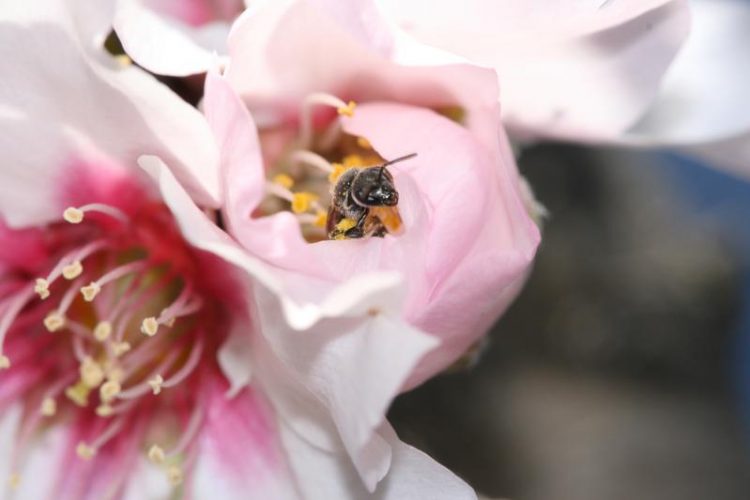Bees Can Be More Important Than Fertilizer

A bee of the genus Panurginus leaves an almond blossom in Northern California. Photo: Alexandra-Maria Klein
A lack of bees and other wild insects to pollinate crop plants can reduce harvest yields more drastically than a lack of fertilizer or a failure to provide the crops with sufficient water.
When crops are adequately pollinated, on the other hand, the plants bear more fruit and their nutrient content changes. These are the findings of an experiment on almond trees conducted in California by the Freiburg ecologist Prof. Dr. Alexandra-Maria Klein and her colleagues from the USA.
The team published articles presenting their findings in the journals Plant Biology and PLoS ONE. Alexandra-Maria Klein will receive the 25,000-euro CULTURA Prize on Tuesday, 17 June 2014, for this and other research projects on the importance of insects for the pollination of crop plants. Conferred by the Alfred Toepfer Foundation, the prize recognizes European scientists for innovative and exemplary research approaches in the areas of nature conservation, agriculture and forestry, and related sciences.
Together with students and colleagues at the University of California, Berkeley, Alexandra Klein manipulated almond trees by preventing bees from pollinating blossoms with the help of cages, allowing the bees to pollinate the blossoms, or pollinating them by hand. In addition, the researchers watered and fertilized trees in accordance with local practices or gave them only little water or no fertilizer.
In the case of several almond trees, they combined the various manipulations in order to study in isolation and in combination the effects on harvest yield and the composition of nutrients in the nuts. The almond trees that were pollinated by hand produced the most nuts, but they were also very small.
By contrast, a tree that was left unpollinated hardly produced any nuts at all – but the few that it did produce were very large. The yield of the trees pollinated by bees was roughly 200 percent higher than that of self-pollinatedtrees.
Fertilization and watering only had an effect on harvest yield in combination with the pollination manipulations. However, the inadequately watered trees lost more leaves, and the leaves of the unfertilized trees increasingly turned yellow.
This led the scientists to the conclusion that an almond tree can compensate for a lack of nutrients and water in the short term by directing stored nutrients and water to the fruits but cannot compensate for insufficient pollination. Furthermore, the scientists demonstrated that the composition of nutrients differs depending on the pollination mode: Nuts from the self-pollinated trees contained a lower proportion of linoleic acid but a higher proportion of vitamin E.
Press release of the Alfred Toepfer Foundation:
http://toepfer-stiftung.de/cultura-preis
Original publications:
- Klein, A.M., Hendrix, S.D., Clough, Y., Scofield, A., Kremen, C. 2014. Interacting effects of pollination, water and nutrients on fruit tree performance. Plant Biology, online first, DOI:10.1111/plb.12180
- Brittain, C., Kremen, C., Garber, A., Klein, A.M. 2014. Pollination and plant resources change the nutritional quality of almonds for human health. PLoS ONE 9: e90082. DOI:10.1371/journal.pone.0090082
Contact:
Prof. Dr. Alexandra-Maria Klein
Chair of Nature Conservation and Landscape Ecology
University of Freiburg
Phone: +49 (0)761/203-67770, +49 (0)176/84321671
E-Mail: alexandra.klein@nature.uni-freiburg.de
Media Contact
All latest news from the category: Life Sciences and Chemistry
Articles and reports from the Life Sciences and chemistry area deal with applied and basic research into modern biology, chemistry and human medicine.
Valuable information can be found on a range of life sciences fields including bacteriology, biochemistry, bionics, bioinformatics, biophysics, biotechnology, genetics, geobotany, human biology, marine biology, microbiology, molecular biology, cellular biology, zoology, bioinorganic chemistry, microchemistry and environmental chemistry.
Newest articles

Properties of new materials for microchips
… can now be measured well. Reseachers of Delft University of Technology demonstrated measuring performance properties of ultrathin silicon membranes. Making ever smaller and more powerful chips requires new ultrathin…

Floating solar’s potential
… to support sustainable development by addressing climate, water, and energy goals holistically. A new study published this week in Nature Energy raises the potential for floating solar photovoltaics (FPV)…

Skyrmions move at record speeds
… a step towards the computing of the future. An international research team led by scientists from the CNRS1 has discovered that the magnetic nanobubbles2 known as skyrmions can be…





















